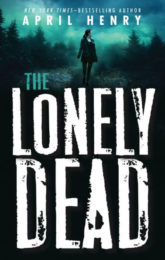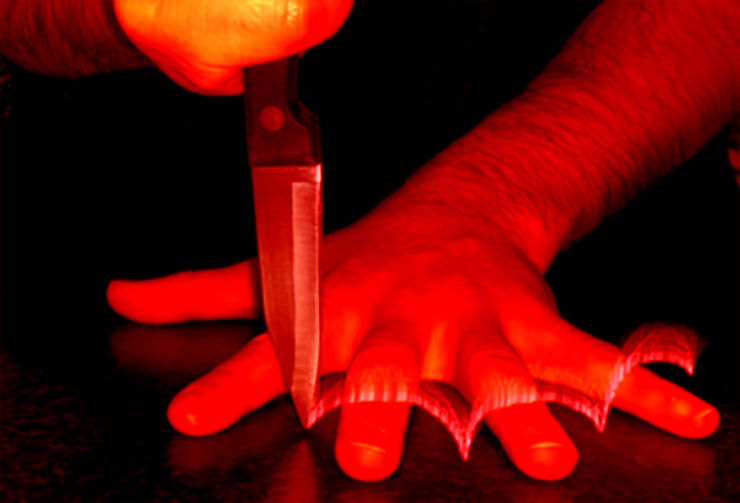“Ah!” Next to me, Hannah screamed as she was stun-gunned by one of our captors. For a brief moment, I was relieved that he’d chosen her and not me. (Forgive me, Hannah.) But soon the prongs were pressed against my neck and I was the one screaming.
At that moment, it was hard to believe I’d actually paid good money to be there. Hannah and I weren’t really kidnap victims. Instead we were taking onPoint Tactical’s Urban Escape and Evasion class. Past participants have included Navy SEALs and special ops folks from various federal agencies. Hannah and I were the first novelists to attend.
The first two days were spent in a hotel room, learning how to pick locks, improvise weapons, get out of zip ties and handcuffs, fend off attack dogs, create fake IDs, and more. The third day we were taken hostage: handcuffed, hooded, duct tape slapped over our mouths. Our captors wore ski masks and carried long guns.
We had to use everything we’d learned first to escape, and then to avoid the ten hunters looking for us. We had no idea who they were, but they had our photos, and they knew the route we would take.
Urban Escape and Evasion was the most intense (and useful!) research I’ve ever done, but I research everything. Is it true that a metal potato peeler can be used as a screwdriver? Yes. Is it really possible to saw through zip ties with your own shoelace? Not unless your captor is using skinny zip ties never meant to restrain a human.
To create a fictional world that’s feels real, you need to do your research. Here’s how I approach researching my mysteries and thrillers.
Read
Reading is the first step. In The Lonely Dead, a character died on the Oregon Trail. To understand how she would talk, I read a half-dozen Oregon Trail diaries.
When I interviewed a DNA expert for Blood Will Tell, I didn’t start with “explain DNA to me.” First I did a lot of reading and then asked specific questions about Y-STR DNA.
Reading is also useful for adding sensory details about something you personally wouldn’t want to experience. I have googled phrases like “I almost drowned” or “when the dog bit me” to find first-person accounts.
Ask
People like to talk about their jobs or hobbies. If I’m just looking for general information, I first do some reading and then take someone to lunch or coffee and ask questions like:
- What was your funniest case? Scariest? Favorite?
- What was the biggest surprise about your job? Something you didn’t expect?
- What’s the best part of job? Worst?
- What’s one thing TV or books always gets wrong?
I also present specific problems. For The Lonely Dead, I asked a therapist friend what she would do if a teenage patient claimed she could talk to the dead. For The White Van, which comes out in 2020, I asked my Brazilian Jiu-Jitsu instructor what a concussion felt like.
Where to find sources? My local chapter of Sisters in Crime (misters welcome as well) has experts speak monthly. I’m a member of the online group Crime Scene Writers, which has lots of retired law enforcement personnel willing to answer questions. And I’ve had good luck emailing experts I find online.
Try it yourself
Your imagination can only take you so far. When I was writing Girl, Stolen, which is about a blind teen, I purchased a collapsible white cane and learning basic caning technique. I also spent a day at The Guide Dog School for the Blind. At the end I was blindfolded and told to harness a guide dog using only my sense of touch to guide me. We won’t discuss how my first attempt ended with me harnessing the tail end of the dog.
In The Girl I Used to Be, the handcuffed main character is being chased through the woods by the person who killed her parents 14 years earlier. So I went to a park with a wooded area, donned a pair of handcuffs, and started running. It turned out to be fairly easy. The only downside was that day the normally quiet park was full of other runners. Interestingly, most of them didn’t notice my handcuffs.
In The White Van, two girls are being held hostage in an old RV parked in the back of a wrecking yard. I talked the City of Portland into letting me tour abandoned RVs they had towed off the streets. Using various household items, I tried to open a Phillips head screw, the kind that’s used to fasten RV ceiling vents. And I visited a pick-n-pull wrecking yard to see what might be lying around on the ground to be used as a weapon. (Lots of things, as it turns out!)
Buy the Book


The Lonely Dead
One small but deeply meaningful way to try things yourself is to go about your normal day while seeing everything through the eyes of your character. A cop or an assassin is going to notice totally different things than you do.
Take a class
A class can give you in-depth knowledge you can’t gain any other way. Last year I spent a week in Wyoming at Launch Pad, a course for writers creating works about science and space.
I’ve also taken classes in firearms, knife fighting, knife throwing, close combat, self-defense, blind self-defense, and active shooter response. Many of these classes were held by martial arts schools. I’ve attended the FBI Citizens Academy, the Writers Police Academy (held at a real police and fire academy), and gone on ride-alongs with officers. I’ve taken classes with teenage volunteers for Multnomah County Sheriff’s Office Search and Rescue. And I recently became certified in wilderness medicine because a character in an upcoming book has extensive first aid experience.
Don’t rely on your best guess, making stuff up, or using something you saw on TV. You owe it to your readers to get it right by reading, asking questions, and experiencing things yourself. And research will make your book so much better!
Image: Knife game, Greg Universe. Shared under the Creative Commons Attribution-Share Alike 3.0 license and adapted from its original form.
April Henry is the New York Times bestselling author of many acclaimed mysteries for adults and young adults, including the YA novels Girl, Stolen and The Lonely Dead, a paranormal thriller on sale January 29. She lives in Oregon.










